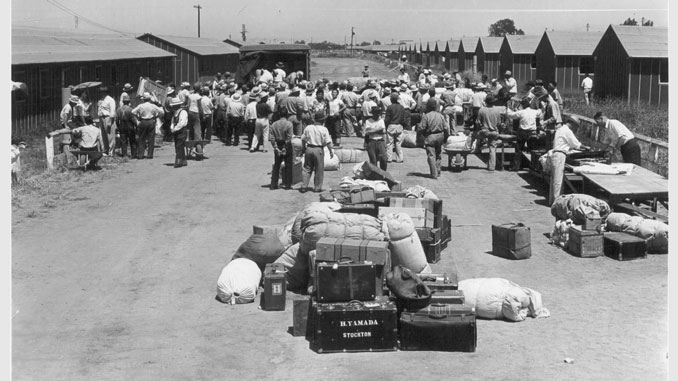
At 1658 South Airport Way in Stockton, at the entrance gate to the San Joaquin County Fairgrounds, there sits a boulder embedded with a steel plaque.
For most, it is an indication of a California Historical Landmark, one of a couple dozen in the county.
For others, it is an afterimage of atrocity—an echo of ghosts who ask us never to forget.
On February 19, 1942, President Franklin D. Roosevelt issued Executive Order 9066, initiating what would be known as one of the most appalling violations of American civil rights in the 20th century: The Japanese-American Relocation.
Hypocrisy was the name of the game: While the United States had just entered the global conflict of World War II, in which it declared Nazi Germany as an enemy, the US seemed to follow Hitler’s blueprint, regarding an entire race as an enemy of the state and forcibly relocating them to camps around the country.
Stockton’s Fairgrounds housed one such location. Though it was not an “internment camp”, the likes of Manzanar and Tule Lake, it was a “Temporary Assembly Center”—a sort of purgatory for Japanese Americans who had been forcibly removed from their homes and were in wait of relocation to a more permanent camp.
The Center opened in May of 1942 and was in operation until October. Though its max capacity was 4,271 people—at its peak—the Center held 4,390 detainees. Some families stayed in barracks with no amenities aside from cots; others were forced to live in horse stables, sleeping on mattress covers stuffed with straw and infested with ticks.
It took two and a half years for President Roosevelt to rescind Executive Order 9066. Over the course of those years, countless families lost their properties, homes, and life savings. They were subject to inhumane treatment and living conditions, stripped of their dignity, and penalized for their ethnicity. As the solemn landmark at the San Joaquin Fairgrounds states, “May such usurpation of civil, social and economic rights, without specific charges or trial, never occur again.”
As we honor and remember those displaced during this dark chapter of America’s history, we can also take part in opportunities to celebrate the vibrant Japanese-American culture that thrives in our community today. Each year, the Stockton Buddhist Temple puts on the Japanese Food Festival & Bon Odori to celebrate Obon, the Buddhist holiday for commemorating one’s ancestors. Be sure to join them on August fourth and fifth to experience cultural dishes, traditional dance, and to celebrate rich Japanese heritage.
Buddhist Church of Stockton’s Food & Cultural Bazaar
Saturday, August, 4, 11 AM- 8:30 PM
Sunday, August, 5, 11 AM – 6 PM
Location: 2820 Shimizu Dr., Stockton
BuddhistChurchofStockton.org

